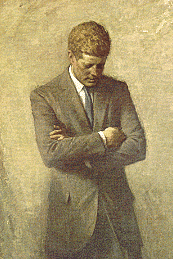|
The 43 Presidents
of the
United States of America

John Fitzgerald Kennedy
35th President
1961 - 1963

| Born |
May 29, 1917 |
| Birthplace |
Brookline, Massachusetts |
| College |
Harvard College, Cambridge,
Massachusetts |
| Religion |
Roman Catholic |
| Ancestry |
Irish |
| Occupation |
Author, congressman, senator |
| Political Party |
Democratic |
| Represented |
Massachusetts |
| Term |
January 20, 1961 - November
22, 1963 |
| Died |
November 22, 1963 |
| Place of Death |
Dallas, Texas |
| Buried |
Arlington National Cemetery,
Virginia |
John F.
Kennedy was the thirty-fifth President of the United States. When
President Kennedy took office, he was the youngest President and rode in a
car with President Eisenhower, who was leaving the presidency as the oldest
President.
Important events during President Kennedy's
administration were:
-
The first live television press conference took
place on January 25, 1961.
-
The Peace Corp was created by executive order on
March 1, 1961.
-
The Committee on Equal Employment Opportunity was
established on March 6, 1961.
-
The residents of District of Columbia were granted
the right to vote for President by the
Twenty-third Amendment on March 29, 1961.
-
The Russian astronaut, Yuri Gagarin, was the first
man to orbit the earth on April 12, 1961.
-
The Bay of Pigs invasion of Cuba took place on
April 17 to 20, 1961.
-
Commander Alan Bartlett Shepard was the first
astronaut to reach 116 miles in altitude on May 5, 1961.
-
The minimum-wage bill increased the hourly rate
from $1.00 to $1.25 per hour on May 5, 1961.
-
The President opened a plant in Freeport, Texas to
convert salt water to fresh water on June 21, 1961.
-
Hijacking of airplanes was made the federal
offense on September 5, 1961.
-
President Kennedy signed the Peace Corps Act on
September 22, 1961.
-
Francis Gary Powers, a convicted Soviet Union U-2
pilot, was released on February 10, 1962.
-
The stock market suffered the worst fall since
1929 on may 28, 1962, but it recovered the next day.
-
The Supreme Court decided that prayers in public
schools was unconstitutional on June 25, 1962.
-
President Kennedy issued an executive order that
race discrimination could not be used in deciding who would live in
federally funded housing.
-
The cost of first-class mail went to 5 cents on
January 7, 1963. It cost 4 cents to mail a postcard.
-
The United States re-started underground testing
of nuclear weapons on February 8, 1963.
-
President Kennedy gave a speech on civil rights to
Congress on February 28, 1963.
-
The U.S.S. Thresher, an atomic submarine, sank in
the North Atlantic Ocean with 129 men aboard on April 10, 1963.
-
Telstar II, a communications satellite, was
launched on May 7, 1963.
-
Governor Wallace of Alabama allowed two African
Americans to enter the University of Alabama on June 11, 1963.
-
The Supreme Court decided it was unconstitutional
to read the Bible in public schools on June 17, 1963.
-
A civil rights march in Washington, D.C. took
place with about 200,000 people, mostly African Americans, on August 28,
1963.
-
President Kennedy was assassinated on November 22,
1963.
John Kennedy was:
-
the first President born in twentieth century.
-
the first President who was Roman Catholic.
-
the first President who was inaugurated on the new
east front of the U. S. Capitol.
-
the first President whose parents survived him.
-
the first President who celebrated his
inauguration with five balls.
-
the first President who was inaugurated and seen
on colored television.
-
the first President who had been in the U.S. Navy.
-
the second President buried in Arlington National
Cemetery, Virginia.
-
the fourth President assassinated.
-
the eighth President to die in office.
-
the fifth President to graduate from Harvard.
-
the first presidential candidate to have a debate
with his opponent shown on television.
-
the youngest presidential nominee and the youngest
man to be elected to the office. President Theodore Roosevelt was the
youngest President to take office, but he became President when President
McKinley died in office.
-
the first President to appoint a brother to be a
member of his cabinet.
-
the first President to have a brother in the
Senate.
-
the first President to witness the firing of a
Polaris missile.

 

|




